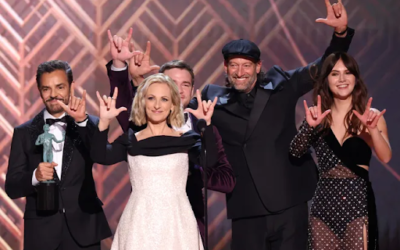Source: NBC News
On Friday, November 5th, “Eternals”, the latest film in the long-running and highly popular Marvel Cinematic Universe, was released to theaters in the United States and throughout many overseas markets. Although critical reception for the Chloe Zhao directed epic has proven to be fairly mixed (with its 48% score on Rotten Tomatoes being the lowest of the franchise so far), the film is at least proving to be a satisfactory financial success judging by its opening weekend. Having earned $71 million in the United States (giving the film the second-highest domestic opening weekend since the beginning of the COVID-19 pandemic) and an additional $90.7 million from overseas markets, the film has so far earned an overall total of $161.7 million; this may pale in comparison to previous MCU titles, but it’s nonetheless a respectable gross given the circumstances. There are some markets, however, that did not allow the film to be exhibited over the weekend, and do not plan on doing so any time soon. The reason for this: the film’s depiction of the franchise’s first LGBT couple.
Although the cast of “Eternals” is quite large, including the likes of Angelina Jolie, Kumail Nanjiani, and several more, the characters that have gained the most attention – both positive and negative – are Phastos and Ben, played by Brian Tyree Henry and Haaz Sleiman respectively. These two characters make up the first same-sex relationship to be prominently featured in the Marvel Cinematic Universe (and one of the few examples of such relationships to be seen in modern-day blockbusters), and as such, reactions have been plentiful and vocal. On the one hand, LGBT rights activists and supporters have been incredibly enthusiastic about the presence of a same-sex couple in a major Hollywood production, hoping that this will lead to greater LGBT representation in future films. On the other hand, in some countries where LGBT rights are much stricter, reception to the film has not been as kind, so much so that “Eternals” has been outright banned in these nations.
Among the markets where “Eternals” will not be available for public viewing are Saudi Arabia, Kuwait, and Qatar, places where same-sex relationships are forbidden from being depicted in their local media. Disney, the company distributing the Marvel superhero film, was allegedly given the offer to make cuts to the film that would allow the film to play and adhere to national policy. The studio refused to do so however, and thus the film was denied a release in these nations as a result. Some neighboring countries, such as Egypt, Jordan, and the United Arab Emirates, will allow the film to be screened, but not without local censors making extensive edits that remove scenes featuring Henry and Sleiman’s characters, as well those that feature any sort of intimate activity (regardless of which sexes are involved).
However, this film is one of only a very small number of major Hollywood productions that have been willing to be this inclusive when it comes to representation of LGBT people. With many major markets still being incredibly restrictive when it comes to LGBT content, with China – easily one of the globe’s largest movie-going markets – being among the most notable of such markets, studios have been incredibly hesitant about depicting same-sex relationships in their films, not wanting to risk losing out on earning revenue from a given market. At most, a film may include a brief reference or visual that can easily be removed; for those seeking greater LGBT representation, this is nowhere near what they would like to see.




